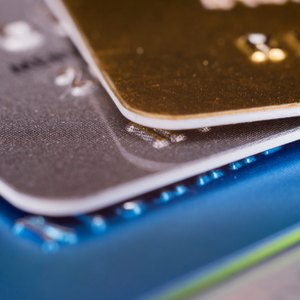
A standard debit card has a direct link to the holder's checking account. When a customer makes a standard debit purchase at the store, the merchant immediately charges the customer's debit card and receives payment from the customer's bank. With a deferred debit card, the merchant does not charge the customer's account immediately, so the charge occurs a few days later.
Tips
A deferred debit card is one for which a charge from the merchant happens with a few days of delay rather than right at the time of purchase.
Dual-Use Debit Cards
Many debit cards can operate as either a standard debit card or a deferred debit card. To make either type of purchase, the debit card holder swipes her card through the merchant's card reader. She can then select either debit or credit; each has a different verification system. With a standard debit purchase, the customer usually enters a personal identification number to verify her identity. To make a deferred debit purchase, the customer generally has to sign the receipt. However, in certain situations where purchase amounts are below a certain amount, customers may not have to sign.
Credit Card Network Requirement
Not all debit cards give the card holder the option of making a deferred debit purchase. Debit cards that can be used to make deferred purchases require a credit card network to authorize the purchase, so the debit card will display the logo of one of the major credit card networks. The deferred debit card can usually be used at any retail store, restaurant, gas station or other merchant that accepts credit cards.
Effects on Account Balance
A deferred debit card is not a credit card, so the debit account normally has a positive cash balance. Although the charge generally takes at least two or three days to clear, it may clear faster, and the account holder has the responsibility to pay for the purchase immediately. If the merchant requests payment and the debit card holder does not have enough money to cover the bill, the bank will charge the card holder an overdraft fee. It is important to carefully track spending with a deferred debit card because a purchase does not immediately reduce the account balance, unlike a standard debit card.
Transaction Fees
A large purchase with a deferred credit card is more expensive than a standard debit purchase. There is typically a cap on the transaction fee for a standard debit card purchase. When the customer uses a deferred credit card, there is no cap on the transaction fee. The reasons for the higher fee are the cost of operating the credit card network and the risk of fraud if the purchaser does not have enough cash in his account to make the purchase. The transaction fee for a deferred debit card purchase can be as high as the transaction fee for a credit card.
References
- BinDB: Payment Card Types
- Bank of America: Glossary of Banking Terms
- ABC News: Why Using Debit Cards Can Be Dangerous
- Federal Reserve: Average Debit Card Interchange Fee by Payment Card Network
- Consumer.gov. "Using Debit Cards." Accessed July 16, 2020.
- Federal Trade Commission. "When a Company Blocks Your Credit or Debit Card." Accessed July 16, 2020.
- Element Federal Credit Union. "Debit Card Holds and Issues Explained." Accessed July 16, 2020.
- Consumer Financial Protection Bureau. "A Closer Look: Overdraft and the Impact of Opting-In," Page 1. Accessed July 16, 2020.
- MyFICO. "What Is Amounts Owed?" Accessed July 16, 2020.
- Federal Trade Commission. "Lost or Stolen Credit, ATM, and Debit Cards." Accessed July 16, 2020.
Writer Bio
Eric Novinson has written articles on Daily Kos, his own blog and various other websites since 2006. He holds a Bachelor of Science in business administration from Humboldt State University.

